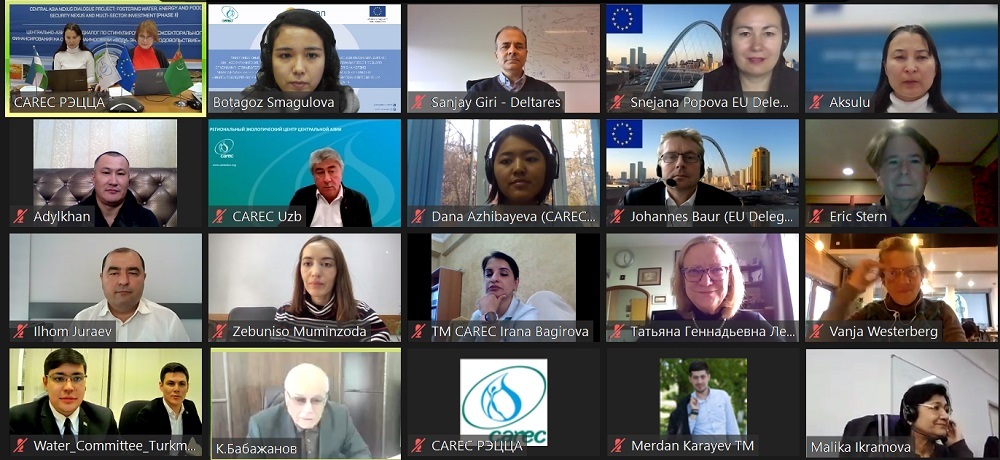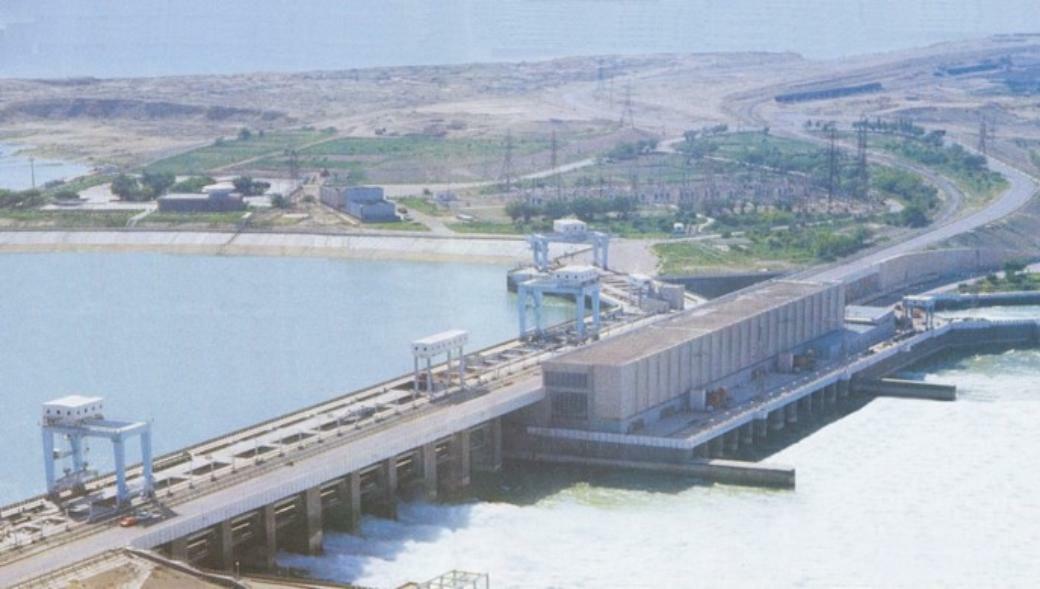Nexus Regional Dialogue Central Asia // European Union supports water reservoir sedimentation treatment efforts in Central Asia
In October, the 6th meeting of the Technical Working Group (TWG) between Uzbekistan and Turkmenistan was held online to take stock of the progress in the implementation of the demonstration project to tackle the sedimentation growth at the Ruslovoe reservoir at the Tuyamuyun Hydroelectric Complex (THC).

CENTRAL ASIA – In October, the 6th meeting of the Technical Working Group (TWG) was held online to take stock of the progress in the implementation of the demonstration project to tackle the sedimentation growth at the Ruslovoe reservoir at the Tuyamuyun Hydroelectric Complex (THC). The TWG was established between Uzbekistan and Turkmenistan in the framework of the EU-funded project “Nexus Dialogue in Central Asia”.
“In line with the EU Green Deal, we promote the Nexus approach to ensure efficient use of such vital resources as water, energy and food. Any action in one of these interlinked sectors should positively contribute to progress in other sectors while preserving ecosystems. We are fully committed to support the green transition through viable investment projects to ensure long-term resilience, peace and prosperity of the region”, stated Dr Johannes Baur, Head of Cooperation at the EU Delegation to Kazakhstan.

At the meeting, the international experts presented their initial findings on the sediment removal fromthe Ruslovoe reservoir and its subsequent recycling and commercial application of them. A technical concept on the framework for a comprehensive sediment management program was proposed. The concept includes four main components: (i) sediment removal (about 1-2 million cubic meters per year); (ii) erosion and sediment inflow management; (iii) a commercial pilot campaign for potential beneficial reuse of removed sediment; and (iv) establishment of monitoring, information, forecasting and early warning systems for water and sediment.
“The reservoir sedimentation at the THC has resulted not only in a huge storage loss, but also in a high risk associated with flood passage and infrastructural safety. This problem needs to be addressed urgently,” stated Dr Sanjay Giri, a river and reservoir sediment management specialist from «Deltares».
To support the decision-making process, a profit and loss analysis was conducted on the urgent action plan to dredge 1-2 million cubic meters of sediments that would require the investment of USD 2.4-4.4 million per year. The initial findings revealed that dredging and sediment storage costs can be fully recovered if only 40% of the sediment is reused and sold to the construction industry. The sediments from the Ruslovoe reservoir are not contaminated and could be utilized with low processing costs.
“Materials for construction are becoming increasingly scarce and there is an imminent supply crisis of sand. In the context of a booming construction industry in Uzbekistan, the clean uncontaminated sediments that may be dredged from the THC offer a promising opportunity to supply valuable materials to construction industry, whilst helping safeguard water, energy and food security”, noted Dr Vanja Westerberg, Economic Consultant, consulting company “Altus Impact”.

The Ruslovoe reservoir controls the flow of the Amudarya River which goes to 3 storage reservoirs at THC (Kaparass, Sultansandjar and Kushbulak) to cover water and irrigation needs of Turkmenistan and Uzbekistan. The volume of siltation has already reached 70%, so it threatens sustainable water supply for local population, ecosystems, and both countries’ economies. THC supplies water for: 1) irrigation of 779,300 ha of land in Uzbekistan and 425,000 ha in Turkmenistan; 2) electric power generation in Uzbekistan (450 million kWh per year); and 3) drinking water in Khorezm Province and the Republic of Karakalpakstan.
The project "Nexus Dialogue in Central Asia" is implemented by the Central Asian Regional Environmental Centre (CAREC). The project’s duration: June 2020 – June 2023; total budget: EUR 1.25 million, including the EU’s contribution of EUR 1 million.
The second phase (2020-2023) of the European Union project "Central Asian Dialogue to Promote Sectoral Financing through the Water-Energy-Food Nexus" is a continuation of the first phase (2016-2019) and is being implemented by the Regional Environmental Centre for Central Asia (CAREC). The project’s duration: June 2020 – May 2023; total budget: EUR 1.25 million with the EU’s contribution of EUR 1 million. The project is a part of the global Nexus Dialogue Programme, which is supported by the European Union (EU) and the German Federal Ministry for Economic Cooperation and Development (BMZ) in five regions.
This article was first published on the CAREC website on October 26th, 2022. It is also available in Russian.
Related Articles
- Nexus Regional Dialogue Central Asia // European Union supports integration of WEF Nexus approach into educational curricula in Kazakhstan
- Nexus Regional Dialogue Central Asia // Support for the application of the WEFE Nexus approach in Central Asia continues to expand
- Nexus Regional Dialogue Central Asia // EU helps identify investment needs to address Water-Energy-Food challenges in Central Asia
